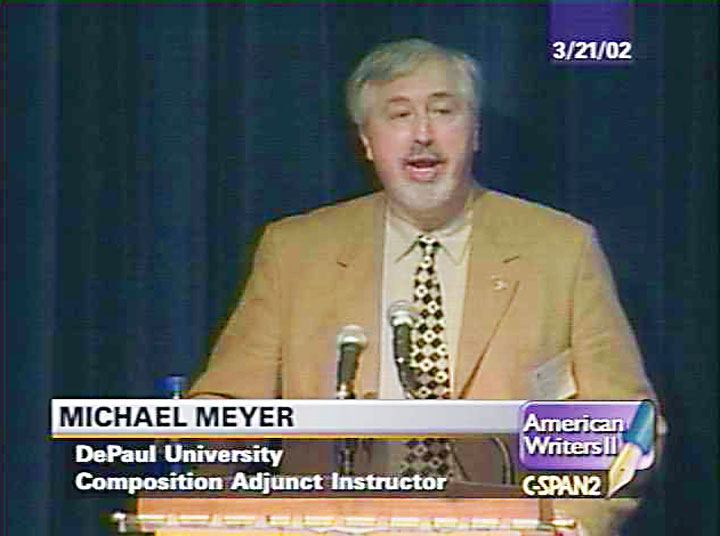 As a Baptist minister in England for 40 years, my attachment to Steinbeck came rather later in life. Over time, literature (particularly drama) became increasingly important in my ministry, to my writing and preaching on the Bible, and in my development of Bible study tools. Steinbeck finally clicked for me in the late 1990s when I read The Grapes of Wrath. My interest in the author ultimately led to writing literary criticism and forming friendships with American scholars. Among them was the late Michael Meyer, whose death in 2011 deeply saddened the international Steinbeck community.
As a Baptist minister in England for 40 years, my attachment to Steinbeck came rather later in life. Over time, literature (particularly drama) became increasingly important in my ministry, to my writing and preaching on the Bible, and in my development of Bible study tools. Steinbeck finally clicked for me in the late 1990s when I read The Grapes of Wrath. My interest in the author ultimately led to writing literary criticism and forming friendships with American scholars. Among them was the late Michael Meyer, whose death in 2011 deeply saddened the international Steinbeck community.
A Bridge Between Bible Study Tools and Literary Criticism
Beyond Steinbeck’s numerous references to religion in The Grapes of Wrath, the book’s biblical and theological themes struck me as revealing much about the author’s life and character. In no way was he irreligious, I thought, and in many respects I found him running very close to Christianity as I understood it—though he might not thank me for saying so.
Knowing that the corpus of literary criticism about Steinbeck (like Bible study tools) is immense, I was only too aware of the hazards of digging in my spade as a writer in such well-trodden territory. My first ventures in Steinbeck literary criticism were occasional articles such as “Rumour of God” and “Steinbeck’s View of God.” The longer I thought about the gap that exists between literary criticism and biblical studies, however, the more clearly I realised that Steinbeck represents rich but neglected territory for biblical scholars, preachers, and publishers of Bible study tools. Unfortunately, my initial attempts to introduce these sources to Steinbeck met with little response. I also realised that much of the literary criticism produced on Steinbeck was equally neglectful of developments in biblical studies. Could Steinbeck become a bridge between the worlds of literary criticism, biblical scholarship, and Bible study tools? I thought so.
Thanks to my son (whose job at the time conveniently took him to California), I had the opportunity to do some digging on my own in Steinbeck’s native soil. Meeting Susan Shillinglaw at San Jose State University and her colleagues in Steinbeck’s home town of Salinas led me to write my first article for the American journal Steinbeck Studies, “Did Steinbeck Know Wheeler Robinson?,” as well to an invitation to present my paper “Did Steinbeck Have a Suffering Servant?” as part of the Steinbeck Centennial Conference held at Hofstra University.
Meeting Michael Meyer, a Master of Literary Criticism
Among the Steinbeck scholars I met at Hofstra in 2002 was Michael Meyer, a professor at DePaul University and an acknowledged master of Steinbeck literary criticism. We shared a taxi from the airport to the campus, and he asked about my background. When I told him that my major interest was biblical studies, particularly the Old Testament, he said that he was a student of the Old Testament as well, and a bond was struck.
In due course Mike asked me to contribute to a new collection of literary criticism he was preparing on The Grapes of Wrath. This invitation led to my article “Biblical Wilderness in The Grapes of Wrath,” later published in The Grapes of Wrath: A Re-consideration. Then, following a brief walk in the byways for a similar contribution to Mike’s collection of literary criticism on Harper Lee—To Kill a Mocking Bird: New Essays—Mike invited me to contribute to a collection of literary criticism on East of Eden. Recently published as East of Eden: New and Recent Essays, the anthology includes my article “A Steinbeck Midrash on Genesis 4: 7.” Mike’s untimely death interrupted the process of publication, which was completed by Henry Veggian of the University of North Carolina at Chapel Hill. When Mike died, I was nine-tenths of my way through another article of literary criticism that Mike had requested on the subject of Steinbeck and Morte d’Arthur.
Thanks to Mike, the bridge between the formerly alien territories of literary criticism and biblical scholarship, theology, and Bible study tools seems firmer than before. Mike was more than a master of Steinbeck literary criticism. He was also a fine editor, warm friend, and encourager of those—like me—who feel increasingly comfortable in both worlds.

